To keep your house from smelling like a dog, start by ensuring good air quality. Open windows regularly for fresh air and invest in HEPA filters and air purifiers. Establish a regular grooming routine, bathing your dog every 4-6 weeks and brushing weekly to reduce fur and dander. Wash your pet's bedding weekly and vacuum often to eliminate odors. Implement a quick clean-up plan for accidents and use pet-safe cleaning products. Finally, feed your dog a balanced diet for overall health. There are even more tips to explore that can enhance your home's freshness!
Importance of Fresh Air
Opening your windows regularly can work wonders in keeping your home smelling fresh and free from dog odors. By allowing fresh air to circulate, you greatly reduce pet odors that can accumulate in your living space. This simple act not only promotes a pleasant environment but also improves air quality, which is essential for your health and comfort. Additionally, using non-toxic cleaners during your cleaning routine can further enhance the freshness of your home without introducing harmful chemicals. Regular cleaning with natural remedies can also help maintain a clean atmosphere, making it easier to keep dog odors at bay.
In homes with airtight designs, like many newer constructions, fresh air circulation becomes even more important. Without it, unpleasant smells and allergens, such as pet dander, can become trapped indoors. You can combat this by opening windows during cleaning or simply as part of your daily routine.
When fresh air flows through your home, it helps minimize the buildup of these irritants. Additionally, consider utilizing HEPA filters in your HVAC system. They capture airborne pet dander, complementing your efforts to maintain a fresh atmosphere. Implementing regular cleaning routines with effective dusting techniques can further enhance your home's freshness and reduce allergens.
Pet Product Management
Managing pet products effectively is essential for keeping your home smelling fresh and clean. Start by choosing the right items to minimize odors and maintain hygiene. Opt for machine-washable pet bedding and covers, and wash them weekly to prevent odor buildup. Implementing a cleaning schedule can also help prioritize these tasks to ensure they are consistently addressed. Additionally, washing pet items in a front-loading washer can reduce energy consumption and enhance cleaning results.
Additionally, look for pet products with antimicrobial or odor-resistant features to enhance cleanliness.
Here are some key practices to reflect upon:
- Regularly clean soft toys and towels used by your pets.
- Incorporate pet-specific odor neutralizers into your cleaning routine.
- Choose durable flooring options like luxury vinyl planks (LVP) that resist pet odors and are easy to clean.
- Store pet products in designated areas to keep clutter at bay.
- Rotate and replace old or worn-out pet items to maintain freshness. Regular grooming routines for pets can also help reduce shedding and minimize hair presence.
Natural Cleaning Solutions

To maintain a fresh-smelling home, incorporating natural cleaning solutions can make a considerable difference. Start with baking soda, a powerful natural deodorizer that absorbs unwanted odors. Sprinkle it on carpets before vacuuming to eliminate those pesky smells.
Vinegar is another eco-friendly option; use it as a fabric softener alternative in your laundry to neutralize odors effectively. For a potent cleaning solution, mix vinegar and baking soda. This combination creates a powerful spray you can use to deodorize fabrics and upholstery, ensuring your home stays smelling fresh. Regularly incorporating natural cleaners can enhance the overall freshness of your living space.
Don't forget to add essential oils like lavender or citrus to your cleaning solutions or diffusers. These oils not only provide a pleasant aroma but also mask pet odors, enhancing your cleaning routine. Additionally, incorporating natural methods for controlling kitchen odors can further help in ensuring your home remains welcoming and fresh.
While you're cleaning, regularly open your windows to improve air circulation. This allows fresh air to replace stale, odor-laden air, considerably boosting indoor air quality.
Regular Grooming Practices
To keep your home smelling fresh, establish a consistent bathing schedule for your dog, aiming for every 4-6 weeks. Regularly changing your dog's bedding and linens can also significantly reduce odors, as accumulation of sweat and oils can lead to unpleasant smells. Don't forget to brush your dog regularly and use grooming wipes for quick clean-ups between baths. Additionally, implementing a 10-minute tidy-up routine can help maintain a clean environment and further reduce odors. These simple practices can greatly reduce odors and keep your furry friend looking and feeling great. Effective organization of bathroom essentials can also contribute to a fresher home atmosphere by promoting cleanliness and reducing clutter.
Establish Bathing Schedule
Keeping your house fresh starts with establishing a regular bathing schedule for your pets. The American Kennel Club suggests bathing dogs every 4-6 weeks, with more frequent baths for long-haired breeds to keep them clean and odor-free.
While cats generally groom themselves, occasional baths can also help reduce odors, especially if they get into dirt or litter.
Here are some tips to help you create an effective bathing schedule:
- Assess your pet's coat: Long-haired breeds may need more frequent baths than short-haired ones.
- Introduce routines early: Bathing puppies and kittens helps them acclimate and makes grooming easier as they grow.
- Balance frequency: Avoid over-bathing, which can strip natural oils; consider using grooming wipes for quick clean-ups.
- Brush regularly: Regular brushing removes dirt and distributes natural oils, promoting a fresher smell.
- Monitor skin health: Pay attention to any skin issues and adjust the bathing schedule accordingly.
Use Grooming Wipes
Incorporating grooming wipes into your pet care routine offers a quick and efficient way to manage odors and dirt between baths. These handy tools help you remove dirt, dander, and odors from your pet's coat without needing water.
Regular use of grooming wipes can greatly reduce the buildup of oils and bacteria on your pet's skin, leading to a fresher home environment.
You'll find grooming wipes especially useful for spot cleaning areas prone to dirt, like your pet's paws after outdoor walks. They're convenient and easy to use, making them a practical addition to your grooming regimen.
Many grooming wipes are infused with deodorizing agents, such as aloe or vitamin E, so your pet can smell pleasant after each wipe-down.
Moreover, using grooming wipes can enhance bonding time with your furry friend. As you wipe them down, you're not just cleaning; you're also spending quality time together, strengthening your relationship.
Regular Brushing Sessions
Regular brushing sessions are essential for maintaining your dog's coat and keeping your home smelling fresh. Ideally, you should brush your dog at least once a week, as this practice helps remove loose fur and dander.
By reducing the amount of hair that accumulates in your home, you can greatly minimize pet odors.
Consider these key points for effective brushing:
- Different breeds have unique grooming needs; long-haired breeds may require more frequent sessions.
- Brushing distributes natural oils, promoting a healthier coat and reducing shedding.
- Incorporate brushing into your pet's routine to strengthen your bond and create a cleaner living space.
- Use specialized grooming tools, like de-shedding brushes or grooming gloves, to enhance the experience.
- Make brushing a positive experience by rewarding your pet afterward.
Accident Management Tips
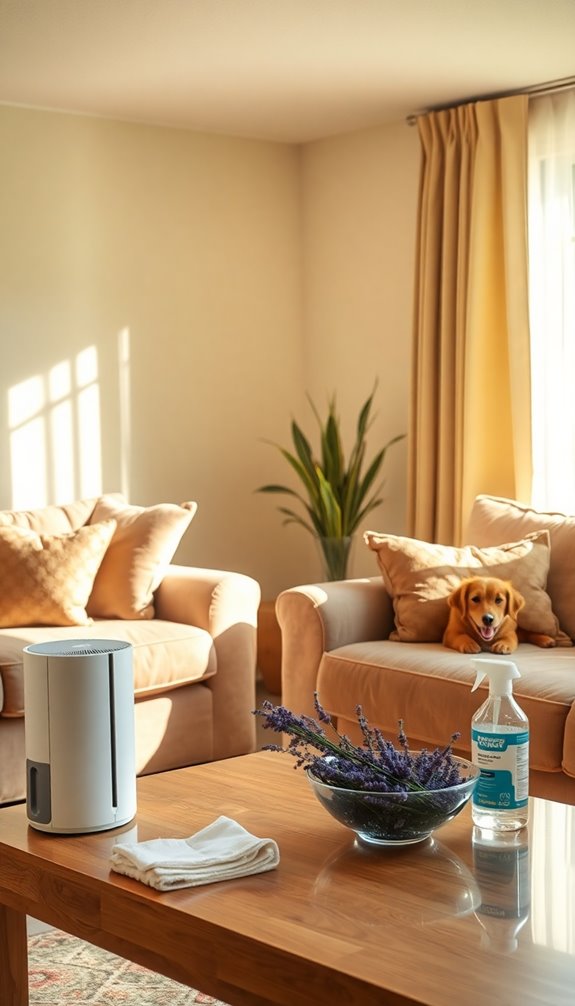
When accidents happen, quick action is vital to minimize odors and prevent your furry friend from returning to the same spot. Use enzymatic cleaners right away; they break down the organic materials causing those unpleasant smells. Professional expertise is essential for ensuring thorough cleanup of deeply penetrated odors, as proper disinfection can significantly reduce harmful bacteria that contribute to lingering odors.
Always keep cleaning supplies, like paper towels and pet-safe cleaners, easily accessible. This way, you can tackle messes immediately, minimizing scent retention and avoiding that wet dog smell.
For solid waste, scoop it up promptly and dispose of it in a sealed bag to prevent lingering odors in your home.
Don't forget to regularly wash any items that have come into contact with accidents, such as bedding and towels. This routine is essential for eliminating odors effectively.
To make sure you haven't missed any spots, consider using a blacklight to identify previously unnoticed urine stains. This tool allows you to thoroughly clean and neutralize odors in those areas, enhancing your accident management efforts. Additionally, regular cleaning of your dog's bedding and toys can further reduce odors and maintain a fresh home environment.
Seasonal Cleaning Considerations
As the seasons change, it's a great time to tackle some essential cleaning tasks to keep your home smelling fresh.
In spring, you can focus on deep cleaning pet areas, while summer requires regular washing of bedding and carpets to combat odors. Additionally, using pH-neutral cleaners during your seasonal cleaning can help maintain the integrity of your floors and prevent lingering smells.
Don't forget about winter, when indoor air quality can suffer, so keeping your home clean is key to a pleasant environment.
Spring Cleaning Essentials
How can you tackle the challenge of keeping your home fresh during spring cleaning? This season offers the perfect chance to deep clean areas where your pets hang out.
Start by washing pet bedding, vacuuming carpets, and steam cleaning upholstery to eliminate those stubborn winter odors. Consider using machine-washable throws and covers on furniture to protect against future pet smells and simplify your cleaning routine.
Here are some spring cleaning essentials to keep your home smelling great:
- Baking soda: A natural odor absorber you can sprinkle on carpets before vacuuming.
- Vinegar: Mix with water for an effective, eco-friendly cleaning solution.
- Air purifier: Invest in one to help filter out pet dander and odors.
- Essential oils: Add a few drops to your cleaning solution for a pleasant scent.
- Litter box supplies: Stock up on fresh litter and cleaning tools for frequent maintenance.
Don't forget to open your windows while cleaning! Fresh air circulation helps dissipate lingering pet smells, making your home feel revitalized this spring.
Regular cleaning of pet areas during this season is key to maintaining a fresh environment year-round.
Summer Odor Prevention Tips
With warmer weather on the horizon, maintaining a fresh-smelling home becomes even more important, especially for pet owners. To effectively combat summer odors, start by increasing ventilation. Open your windows to allow fresh air circulation, which helps reduce the stagnant smells often associated with pets.
Regularly clean and deodorize your pet's bedding; aim to wash it at least once a week during these hotter months. High temperatures can intensify odors, so staying on top of this task is vital.
You should also schedule more frequent vacuuming to manage increased shedding and dander. Pay special attention to carpets, rugs, and upholstery to minimize odor buildup.
Incorporate natural odor-absorbing agents like baking soda in pet areas and carpets. It's an effective and pet-safe way to neutralize unwanted smells.
Finally, consider investing in an air purifier with a HEPA filter. This can capture pet dander and allergens while greatly improving your indoor air quality.
Winter Indoor Air Quality
Winter can trap odors inside your home, making it essential to prioritize indoor air quality.
With windows closed and heating systems running, stagnant air can lead to unpleasant smells, especially from your furry friends.
Here are some effective tips to keep your home smelling fresh during the colder months:
- Ventilate Regularly: Open windows when possible to allow fresh air in and help disperse trapped odors.
- Use Air Purifiers: Invest in air purifiers with HEPA filters to capture pet dander and reduce odors effectively.
- Replace Filters: Regularly change air filters in your heating system to prevent the circulation of pet hair and lingering smells.
- Dehumidify: Utilize dehumidifiers to combat winter humidity, reducing musty odors and inhibiting mold growth.
- Establish a Cleaning Schedule: Wash pet bedding and upholstery frequently to eliminate odors that accumulate from increased indoor time.
Bathing Schedule for Pets
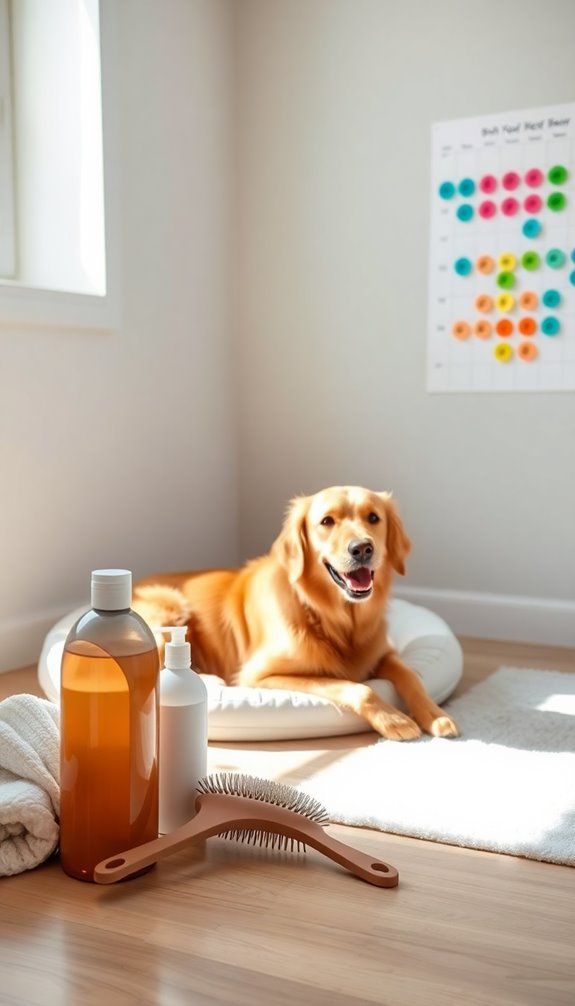
Establishing a proper bathing schedule for your pets is essential for keeping your home smelling fresh. The American Kennel Club recommends bathing dogs every 4-6 weeks. If you have a long-haired breed, you might need to bathe them more frequently to keep their coat clean and odor-free.
For cats, while they're generally good at self-cleaning, occasional baths can help reduce odors and maintain their coat's freshness. Consider introducing baths to kittens early on; this acclimates them to the process, making it easier for you both later in life.
However, be cautious about over-bathing your pets. Excessive baths can strip their skin of natural oils, leading to dryness and irritation. To balance your bathing schedule for pets, incorporate regular grooming practices like brushing to help remove dirt and loose fur without frequent baths.
In between baths, use grooming wipes or damp washcloths for quick clean-ups. These can be particularly helpful for spot cleaning and keeping your pets fresh without the hassle of a full bath.
With a consistent bathing schedule and maintenance routine, you'll keep your home smelling great!
Maintaining Clean Bedding
Keeping your dog's bedding clean is essential for maintaining a fresh-smelling home. Regularly washing pet beds and covers at least once a week helps prevent the buildup of dirt, bacteria, and odors.
Opt for machine-washable pet beds and removable liners to make cleaning easier. Incorporate vacuuming pet bedding into your routine to tackle hair and dander that can accumulate and lead to unpleasant smells.
Here are some tips for maintaining clean pet bedding:
- Wash pet beds and covers weekly for freshness.
- Use odor-neutralizing laundry detergents or add baking soda to the wash.
- Vacuum pet beds regularly to remove hair and dander.
- Replace non-washable dog beds annually to prevent lingering odors.
- Dry pet bedding thoroughly to avoid musty smells.
Daily Litter Box Care
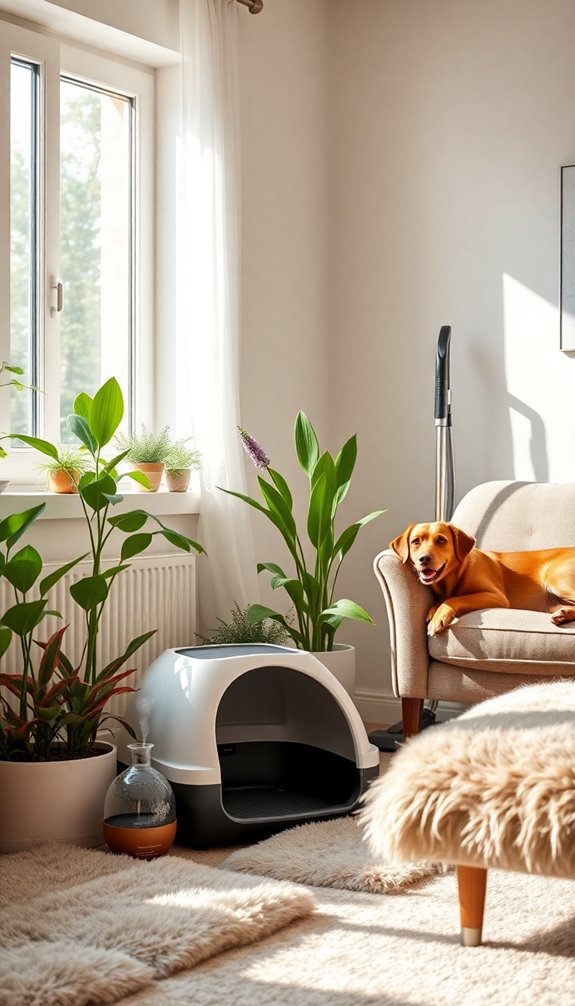
How often do you think about the importance of daily litter box care? Keeping your litter boxes clean is essential for maintaining a fresh-smelling home.
Scoop the litter box daily to remove waste and prevent strong odors from building up. This simple task also helps reduce the risk of bacterial growth.
Consider using clumping litter, as it effectively contains odors and makes daily scooping more efficient. When you scoop, you'll notice solid waste clumps that are easy to remove.
It's equally important to change the litter completely at least once a week. During this change, wash the litter box with soap and water to eliminate any lingering smells.
If you haven't already, think about investing in a litter box with a cover or a high-sided design. These features can help contain odors and litter, while providing your cat with some privacy.
Lastly, keep an eye on the litter box for any unusual odors that might signal health issues. Early detection can lead to quicker solutions, potentially saving your furry friend from more significant problems.
Regular litter box care not only keeps your home smelling fresh but guarantees your pet's well-being.
Healthy Diet for Pets
A healthy diet for your pets plays an essential role in keeping your home smelling fresh. When you provide your furry friends with a balanced diet rich in high-quality proteins, healthy fats, and essential nutrients, you can greatly reduce digestive issues that often lead to unpleasant odors.
Incorporating foods with probiotics and prebiotics promotes a healthy gut microbiome, minimizing gas and digestive odors.
To enhance your pet's diet, consider the following:
- Include fresh fruits and veggies (like carrots and apples) for dental health.
- Avoid low-quality dog foods filled with fillers and artificial additives.
- Consult a veterinarian to tailor your pet's diet to their specific needs.
- Monitor your pet's body condition and adjust their food intake accordingly.
- Keep your pet hydrated with fresh water to aid digestion.
Immediate Mess Clean-Up
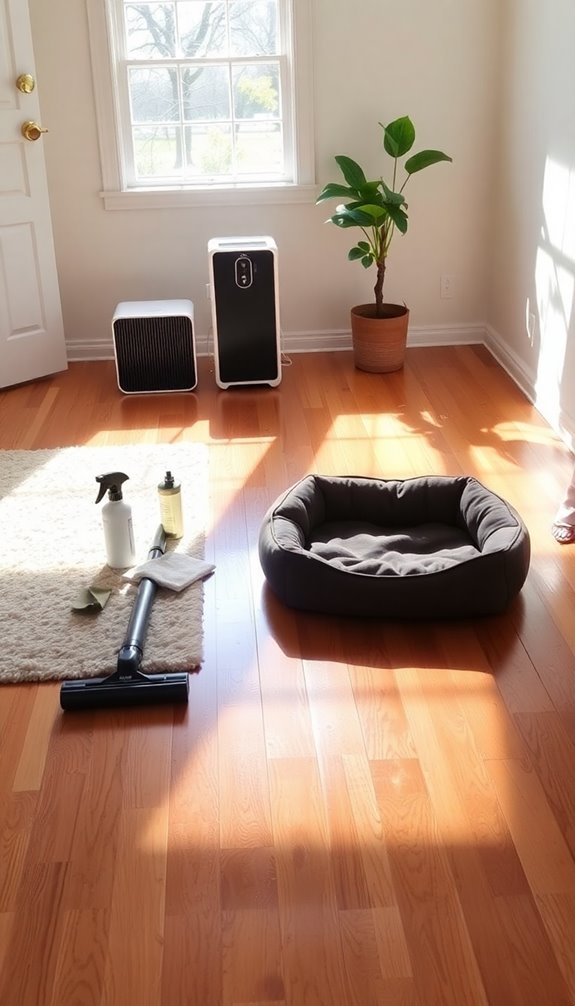
When your pet has an accident, don't wait—jump into action right away.
Using effective cleaning products, like enzymatic cleaners, can make all the difference in managing odors.
Quick Accident Response
Accidents happen, but quick action can make all the difference in keeping your home smelling fresh. When your pet has an accident, don't wait; respond swiftly to prevent lingering odors.
Start by having a cleaning kit nearby, stocked with pet-specific cleaning supplies.
Here's what you should include in your kit:
- Absorbent towels
- Pet-safe enzymatic spray cleaners
- Disposable gloves
- A scooper for solid waste
- Airflow-enhancing fans
When you spot a mess, blot the area with a clean cloth to absorb as much liquid as possible. Rubbing can spread the mess, making it harder to clean.
For solid waste, use a scooper and seal it in a bag to minimize odor transfer. Once you've cleaned the area, allow it to dry thoroughly.
Boost airflow to help moisture evaporate quickly, as trapped moisture can lead to persistent odors.
Effective Cleaning Products
Maintaining a fresh-smelling home requires the right cleaning products to tackle messes effectively. Start by investing in enzymatic cleaners. These effective cleaning products break down the proteins present in pet waste, ensuring odors are eliminated and your home stays fresh.
For quick clean-ups, keep pet-safe cleaning wipes on hand. They allow you to react immediately to spills or accidents, preventing lingering smells.
Another natural option is baking soda. Sprinkle it on carpets or upholstery after a mess, and vacuum it up later to absorb any odors before they settle in.
If you prefer something specifically designed for pets, consider pet-specific odor neutralizers that contain safe ingredients to target and eliminate those pesky smells without harsh chemicals.
For fabric surfaces, a simple mixture of vinegar and water can work wonders. Spray it on affected areas; vinegar is known for its odor-absorbing properties.
By using these effective cleaning products, you can maintain a cleaner, fresher-smelling home that's free from unwanted pet odors.
With the right tools, you'll be able to tackle messes as they happen, keeping your living space enjoyable for both you and your furry friend.
Regular Vacuuming Routine
A regular vacuuming routine is essential for keeping your home fresh and free from dog odors. Establish a schedule to vacuum at least once a week, focusing on carpets, rugs, and upholstery, which are the primary sources of pet smells.
Using a vacuum with a HEPA filter helps capture allergens and minimizes the spread of odors throughout your space.
Here are some tips to enhance your regular vacuuming routine:
- Target high-traffic areas and your dog's favorite resting spots for thorough cleaning.
- Don't forget to vacuum soft surfaces like curtains and cushions, as they can trap pet hair and odors.
- Utilize vacuum attachments designed for pet hair removal to boost cleaning efficiency.
- Empty the vacuum bag or canister regularly to prevent odors from lingering.
- Consider adding a sprinkle of baking soda to your vacuum bag for added freshness.
Using Air Purifiers
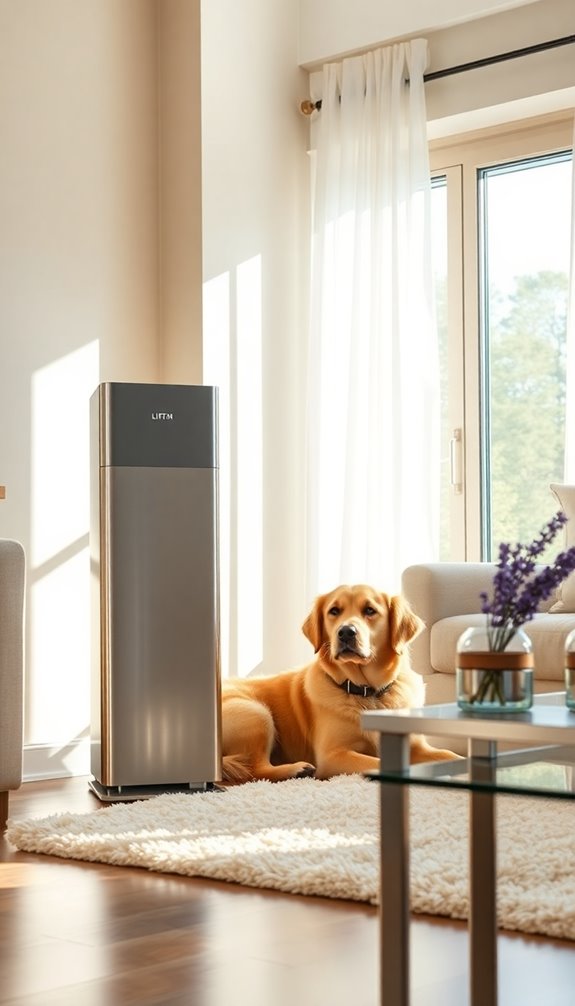
To effectively combat pet odors, using air purifiers can be a game-changer for your home. These devices considerably reduce unpleasant smells by capturing airborne particles like dander and hair, greatly enhancing your indoor air quality.
If you choose a model equipped with HEPA filters, you're in luck! These filters can remove 99.97% of particles as small as 0.3 microns, including pet allergens.
For best results, you should place air purifiers in high-traffic areas where your pets spend the most time, such as your living room or near their beds. This way, they can neutralize odors right at the source.
Additionally, consider models that include activated carbon filters, specifically designed to absorb and eliminate odors, giving you the dual benefits of air purification and odor control.
Conclusion
Keeping your house from smelling like a dog doesn't have to be a tall order. By letting in fresh air, managing pet products wisely, and sticking to regular grooming, you can create a welcoming home. Don't forget to clean up messes right away and maintain a solid vacuuming routine. With a little effort and a few natural cleaning solutions, you'll have your home smelling fresh in no time. Remember, a happy pet means a happy home!